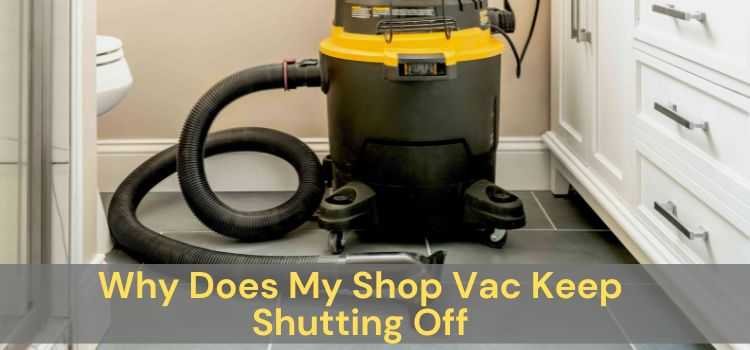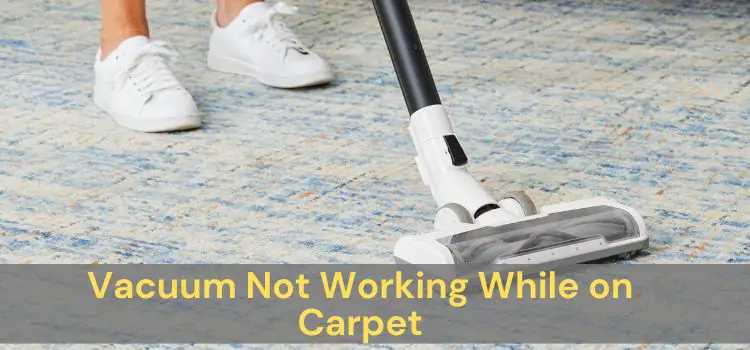· Troubleshooting · 8 min read
Why Is My Vacuum So Hard to Push? Quick Fixes & Tips

A hard-to-push vacuum may have clogged filters or incorrect height settings. These issues increase resistance and reduce maneuverability.
Maintaining a vacuum can be crucial for ease of use and efficiency. Clogged filters restrict airflow, making the vacuum harder to push.
Regularly cleaning or replacing filters can solve this problem. Incorrect height settings also contribute to the difficulty. Adjusting the vacuum height to match the floor type ensures smoother operation.
Worn-out or tangled brushes can add resistance, making it harder to move the vacuum. Regular maintenance, including checking brushes and wheels, can help.
Keeping your vacuum in top condition ensures it works effectively and is easy to handle. Proper care extends its lifespan and ensures optimal performance.
Experiencing Resistance?
Is your vacuum cleaner hard to push? This can be frustrating. The reasons vary. Let’s explore two common causes.
Carpet Height Considerations
Carpet height affects how your vacuum moves. Check the height settings.
- Low setting for thin carpets
- Medium setting for regular carpets
- High setting for thick carpets
Adjusting the height can make pushing easier. Use the right setting for your carpet.
Checking For Blockages
Blockages can cause resistance. Check your vacuum for clogs.
- Turn off and unplug the vacuum.
- Inspect the hose and nozzle.
- Remove any visible debris.
- Check the brush roll for hair or strings.
Clear blockages to improve performance. Regular checks help maintain suction.
Vacuum Anatomy 101
Understanding why your vacuum is hard to push starts with its anatomy. Knowing the key parts can help you troubleshoot common issues. In this section, we’ll dive into important components that affect vacuum performance.
Brush Roll Functionality
The brush roll is a spinning brush located at the base. It helps lift dirt and debris from the floor. If the brush roll doesn’t spin freely, your vacuum might be tough to push.
Common issues include:
- Hair and threads tangled around the brush roll
- Worn-out bristles
- Obstructions blocking the brush roll
To check the brush roll, turn your vacuum over. Look for any blockages or damage. Clean off any debris you find. Replace the brush roll if needed.
Belt Health Check
The belt connects the brush roll to the motor. If the belt is broken or worn out, the brush roll won’t spin properly.
Signs of a bad belt include:
- Loose or slack belt
- Cracks or fraying
- Burnt rubber smell
To inspect the belt, remove the base cover. Check the belt for any visible damage. Replace the belt if it looks worn or broken.
Maintaining a healthy belt ensures that the brush roll functions well. This makes your vacuum easier to push.
Height Adjustment Hacks
Struggling to push your vacuum cleaner? The height adjustment setting could be the culprit. Understanding the height adjustment hacks can make vacuuming easier. It ensures optimal performance on different surfaces.
Manual Vs. Automatic Adjustment
Many vacuum cleaners come with either manual or automatic height adjustments. Knowing the difference helps you choose the right setting.
- Manual Adjustment: Requires you to set the height yourself. This is often done using a lever or dial.
- Automatic Adjustment: The vacuum adjusts the height based on the surface. This feature is more convenient but may not always be accurate.
Optimal Settings For Different Surfaces
Different surfaces require different vacuum heights. Setting the right height can improve cleaning efficiency. Here are the best settings for common surfaces:
| Surface Type | Height Setting |
|---|---|
| Hardwood Floors | Lowest setting to avoid scratching |
| Low-Pile Carpet | Medium setting for effective debris removal |
| High-Pile Carpet | Highest setting to prevent resistance |
Using the correct height setting ensures your vacuum glides smoothly. It also extends the life of your vacuum and your floors.
Suction Troubles
Struggling to push your vacuum? It might be due to suction troubles. Strong suction can make the vacuum harder to move. Let’s explore some common causes of suction troubles.
Filter Maintenance
Dirty filters can reduce airflow. This causes the vacuum to suck harder and move slower.
- Check and clean the filters regularly.
- Replace filters according to the manufacturer’s instructions.
Proper filter maintenance ensures your vacuum runs smoothly.
Airflow Obstructions
Blockages in the vacuum can lead to hard pushing. Common obstructions include:
- Clogged hoses
- Debris in the brush roll
- Full dust bag or bin
To keep your vacuum moving easily, check for and remove any obstructions.
| Issue | Solution |
|---|---|
| Clogged hoses | Remove and clean hoses |
| Debris in brush roll | Clear out debris |
| Full dust bag/bin | Empty dust bag or bin |
Wheel And Axle Inspection
Is your vacuum hard to push? The wheels and axles might be the problem. They play a crucial role in the vacuum’s movement. Inspecting them can solve the issue. Below are some tips to make this task easier.
Lubrication Tips
Wheels and axles need lubrication to work smoothly. Use a silicone-based lubricant. Avoid oil-based lubricants as they attract dust. Apply the lubricant to the axles and wheel hubs. Rotate the wheels to spread it evenly. This ensures they move freely.
Debris Removal
Debris can get stuck in the wheels and axles. This makes pushing the vacuum difficult. Use a small brush to clean the wheels. Remove any hair or threads wrapped around the axles. Check for any small objects stuck in the wheel wells. Keeping them clean ensures smooth movement.
| Inspection Task | Frequency |
|---|---|
| Lubricate Wheels | Monthly |
| Remove Debris | Weekly |
Regular inspection of the wheels and axles can solve many movement issues. Keeping them clean and lubricated ensures your vacuum works smoothly.
Tackling The Brush Roll
If your vacuum is hard to push, the brush roll might be the issue. The brush roll is essential for picking up dirt and debris.
When it gets clogged, your vacuum struggles to move. Let’s explore how to handle common brush roll problems effectively.
Removing Entangled Hair And Fibers
Hair and fibers often get stuck in the brush roll. This makes it hard for the vacuum to work properly.
Here’s how to clear the brush roll:
- Turn off and unplug the vacuum.
- Remove the brush roll cover. You may need a screwdriver.
- Use scissors to cut away entangled hair and fibers.
- Pull out the loosened debris with your fingers or tweezers.
- Reattach the brush roll cover.
Regularly cleaning the brush roll keeps your vacuum running smoothly.
Replacement Recommendations
Sometimes, cleaning is not enough. If the brush roll is damaged, replacing it is best.
Here’s how to check:
- Inspect the brush roll for worn bristles.
- Look for cracks or breaks.
- Check if the roll spins freely. If not, it may be time for a new one.
Most vacuum manufacturers sell replacement brush rolls. Check your model number before purchasing. Installing a new brush roll can make your vacuum easier to push.
The Role Of Vacuum Weight
Struggling to push your vacuum? The weight of your vacuum cleaner might be the problem.
The weight of a vacuum cleaner significantly affects its ease of use. Heavier vacuums can be more challenging to maneuver.
Let’s explore why vacuum weight matters so much.
Material And Design Factors
The materials used in the vacuum affect its overall weight. Many vacuums are made of plastic, which is lighter.
Others use metals, making them heavier. The design also impacts the weight. Vacuums with large motors or extra features weigh more.
| Material | Weight |
|---|---|
| Plastic | Light |
| Metal | Heavy |
- Plastic vacuums are easier to push.
- Metal vacuums offer durability but can be hard to move.
Balancing Power And Maneuverability
Powerful vacuums often have stronger motors. These motors add weight to the vacuum.
Balancing power with maneuverability is key. Lightweight vacuums are easier to push but may lack power.
- Assess the weight of your vacuum before buying.
- Consider if you need a more powerful motor.
- Look for vacuums with ergonomic designs.
Some vacuums come with self-propelled features. These can help move the vacuum for you. This feature makes heavy vacuums easier to handle.
Professional Help Vs. Diy
Is your vacuum cleaner giving you a tough time? You might wonder whether to call a professional or fix it yourself.
This decision depends on the problem’s complexity. Let’s explore both options to help you make an informed choice.
When To Seek A Technician
Some vacuum problems are too complex to fix at home. Here are signs you should call a technician:
- Electrical issues: If the vacuum won’t turn on, seek professional help.
- Strange noises: Loud or unusual sounds can indicate internal damage.
- Burning smell: This might mean motor or wiring problems.
- Loss of suction: Persistent suction issues may need expert attention.
Technicians have the tools and knowledge to fix these issues safely and efficiently.
Simple Fixes You Can Do
Many vacuum issues are easy to solve at home. Here are some simple fixes:
- Check the roller brush: Remove hair and debris wrapped around it.
- Clean or replace filters: Clogged filters can reduce suction power.
- Empty the dustbin: A full dustbin makes the vacuum harder to push.
- Inspect the hose: Look for blockages or kinks in the hose.
These steps can often restore your vacuum’s performance without needing professional help.
If you’re unsure about any fix, it’s safer to consult a technician. But many common issues are easy to handle on your own.
Frequently Asked Questions
Why Is A Vacuum Hard To Push On Carpet?
A vacuum is hard to push on carpet due to increased friction and suction power. Carpet fibers resist the vacuum’s movement.
Why Is My Shark Vacuum So Hard To Push?
Your Shark vacuum might be hard to push due to clogged filters, a full dust bin, or incorrect height settings. Ensure filters are clean, empty the dust bin, and adjust the height for your floor type. Regular maintenance can prevent this issue.
Which Vacuum Cleaner Will Be Easier To Push?
A lightweight vacuum cleaner with swivel steering and large wheels will be easier to push. Look for models designed for effortless maneuvering.
Why Is My Vacuum Suction Too Strong?
Your vacuum suction may be too strong due to an adjustable suction setting. Check the manual and adjust accordingly.
Conclusion
A hard-to-push vacuum can be frustrating. Regular maintenance and checking for blockages can help. Ensure the brush roll is clean and functioning.
Adjust the height settings for different carpet types. These steps can make vacuuming easier and more efficient.
Keep your vacuum in top shape for the best performance.




